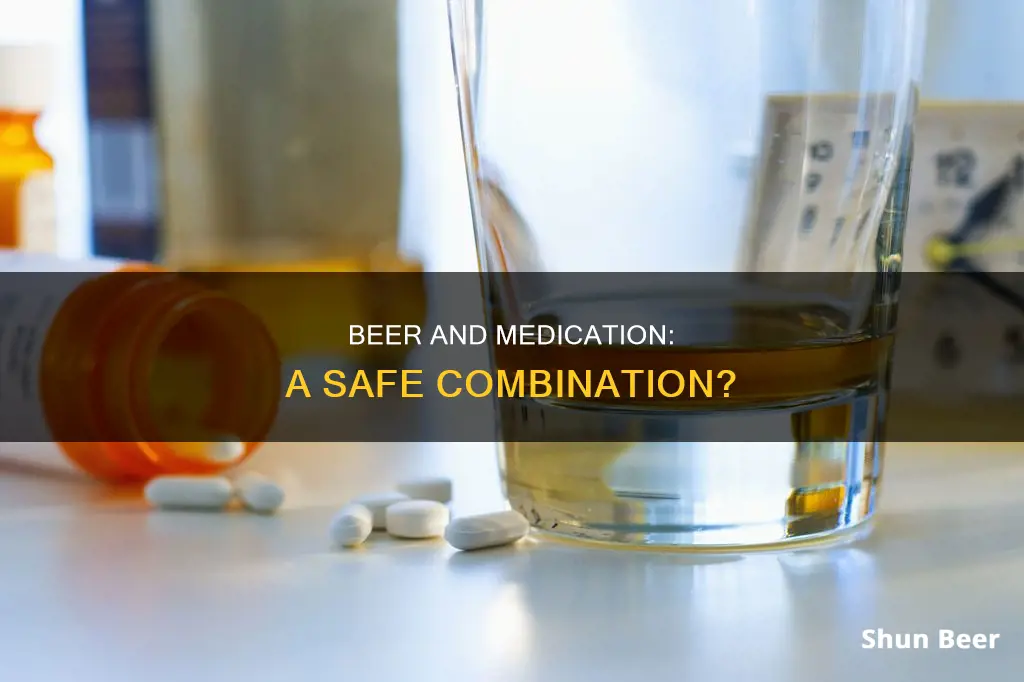
Drinking alcohol while taking medication is a potentially dangerous combination. Alcohol can interact with medication in various ways, such as reducing its effectiveness, causing adverse health consequences, or even leading to overdose and death. The type of medication, the amount of alcohol consumed, individual health factors, and age and sex all play a role in determining the safety of mixing alcohol and medication. It is always advisable to consult a healthcare professional before consuming alcohol with any medication to avoid harmful interactions.
| Characteristics | Values |
|---|---|
| Should I drink alcohol while taking medication? | It depends on the medication and several other factors. Always consult a doctor or pharmacist before drinking alcohol while taking medication. |
| Factors | Type of medication, type and amount of alcohol, age, sex, individual health factors, and metabolism. |
| Effects of drinking alcohol while taking medication | Drowsiness, forgetfulness, lightheadedness, impaired judgment, trouble concentrating, liver damage, or death. |
| Antibiotics and alcohol | Can lead to severe vomiting, raised temperature, nausea, vomiting, flushing of the skin, accelerated heart rate, dizziness, and drowsiness. |
| Painkillers and alcohol | Prescription painkillers such as tramadol, gabapentin, and codeine should not be mixed with alcohol. Over-the-counter painkillers like paracetamol and ibuprofen are usually safe within low-risk drinking guidelines. |
| Antidepressants and alcohol | Should be avoided, especially monoamine oxidase inhibitors (MAOIs) like Parnate and Nardil, which can cause a dangerous spike in blood pressure when combined with tyramine found in beer. |
| Cold or allergy medicine and alcohol | Can increase the risk of overdose and amplify side effects like impaired judgment and coordination and slow reaction time. |
| Blood pressure medication and alcohol | Can cause dizziness, fainting, extreme sleepiness, and arrhythmias or other heart problems. |
| Sleep aids and alcohol | Can cause difficulty breathing, memory problems, strange behavior, dizziness, and impaired motor control. |
| Diabetes medication and alcohol | Can lead to dangerously low blood sugar levels and sudden changes in blood pressure. |
| Cholesterol medication and alcohol | Can cause liver damage, flushing and itching, and stomach bleeding. |
What You'll Learn
- Antibiotics and alcohol can cause serious side effects like nausea, vomiting, and accelerated heart rate
- Alcohol interacts with antidepressants and can increase the risk of overdose and depression
- Drinking with painkillers can be dangerous, leading to severe drowsiness and nausea
- Alcohol and blood pressure medications can cause dizziness, fainting, and arrhythmias
- Mixing alcohol with sleeping pills can cause breathing difficulties, memory problems, and strange behaviour

Antibiotics and alcohol can cause serious side effects like nausea, vomiting, and accelerated heart rate
Antibiotics are powerful medications that destroy or slow down the growth of bacteria. While they are usually safe when used as directed, they can also come with a risk of side effects such as an upset stomach, nausea, and diarrhea. These effects can be amplified when taken with alcohol, and additional side effects may occur, such as vomiting, dizziness, drowsiness, headaches, and even potentially life-threatening seizures.
When the body breaks down alcohol, it produces acetaldehyde, which can cause nausea. Many people taking antibiotics already experience stomach or digestive side effects, and drinking alcohol while on these medications can increase feelings of nausea. In addition to gastrointestinal issues, both alcohol and antibiotics can hinder cognitive function, concentration, and coordination.
Drinking alcohol while taking antibiotics can also lead to serious side effects, including nausea, vomiting, flushing of the skin, accelerated heart rate, dizziness, and drowsiness. Metronidazole and tinidazole are two examples of antibiotics that should never be combined with alcohol. It is also important to read the leaflet that comes with your medication and consult your pharmacist or doctor if you have any questions.
The combination of alcohol and antibiotics can also negatively impact your body's ability to recover from an infection. Getting enough rest and eating a nutritious diet are crucial for healing from sickness or infection, and alcohol can interfere with these factors. Alcohol can disrupt sleep patterns and increase blood sugar levels, zapping your energy levels.
In summary, it is best to avoid alcohol while taking antibiotics due to the potential for harmful interactions and negative effects on the immune system. It is recommended to wait until you have completed your course of antibiotics before consuming alcohol, and even then, moderation is key.
Understanding Beer Shanks: How Do They Work?
You may want to see also

Alcohol interacts with antidepressants and can increase the risk of overdose and depression
It is important to know how alcohol interacts with your medication. Alcohol interacts with some medications, and this can lead to dangerous health consequences. Antidepressants are prescription medications used to treat the symptoms of depression, chronic pain, and other mood disorders. They work by increasing the levels of certain chemicals, such as serotonin and dopamine, in the brain.
Drinking alcohol while taking antidepressants can increase the risk of overdose and depression. Antidepressants can cause drowsiness and dizziness, which can be intensified when mixed with alcohol. This increases the risk of falls and car accidents. Mixing antidepressants with alcohol can also increase feelings of depression or hopelessness. Some antidepressants, such as monoamine oxidase inhibitors (MAOIs), can cause serious heart problems when combined with alcohol. MAOIs can also cause dangerously high blood pressure due to an alcohol byproduct called tyramine.
The risk of overdose is also higher when antidepressants are mixed with alcohol. It is possible to overdose on any type of antidepressant, especially when taken with other drugs or medications. The risk of toxicity and death is much higher when a high dose of an antidepressant is taken with alcohol or other drugs. Tricyclic antidepressants (TCAs) have been shown to have more fatal outcomes than other types of antidepressants when overdosed.
If you are taking medication, always consult your doctor or pharmacist before drinking alcohol. This is essential to ensure that you are not putting yourself at risk.
Beer and Keflex: What You Should Know
You may want to see also

Drinking with painkillers can be dangerous, leading to severe drowsiness and nausea
Drinking alcohol with painkillers can be dangerous and can lead to severe drowsiness and nausea. The combination of alcohol and painkillers can also cause an increased risk of overdose, as well as difficulty breathing, impaired motor control, unusual behaviour, and memory problems.
The specific effects of mixing alcohol and painkillers will depend on the type of painkiller and the amount of alcohol consumed. However, it is generally advised that alcohol is avoided while taking prescription-only painkillers, such as tramadol, gabapentin, and codeine, as well as morphine-like drugs. Mixing alcohol with these medications can lead to severe drowsiness and other side effects, including nausea.
Over-the-counter painkillers, such as paracetamol and ibuprofen, are unlikely to cause problems when consumed with alcohol in small amounts and within the recommended guidelines. However, it is always important to read the leaflet that comes with the medication and consult a doctor or pharmacist if you are unsure.
Additionally, some over-the-counter painkillers are stronger than others, and certain cold and flu remedies also contain sedatives, which can be dangerous when mixed with alcohol. It is important to be aware of the ingredients in your medication and how they might interact with alcohol.
The combination of alcohol and painkillers can also be affected by individual factors such as age, sex, metabolism, and alcohol tolerance. As people age, alcohol stays in their system longer, and they are more likely to be taking medications that could interact with alcohol. People assigned female at birth also tend to have higher blood alcohol levels than their male counterparts after consuming the same amount.
In summary, drinking alcohol with painkillers can be dangerous and lead to severe drowsiness, nausea, and other side effects. It is important to consult a doctor or pharmacist before mixing alcohol with any medication to ensure your safety and avoid adverse health consequences.
Beer: World's Savior, Ancient Beverage
You may want to see also

Alcohol and blood pressure medications can cause dizziness, fainting, and arrhythmias
Drinking alcohol while taking medication can be dangerous, and it's important to know how long you should wait after taking medicine before consuming alcohol. Many factors influence whether or not it's safe to drink alcohol with or after taking medication, including the type of medicine and alcohol, and your age and sex.
When mixed with alcohol, blood pressure medications can cause dizziness, fainting, and arrhythmias. This is due to the interaction between the alcohol and the medication, which can lead to orthostatic hypotension, or low blood pressure when you stand up from a sitting or lying down position. This may result in dizziness, lightheadedness, or fainting. These effects can be more severe at the beginning of treatment or when increasing the dose of medication.
Additionally, alcohol itself can lower blood pressure, which may worsen side effects such as dizziness and lightheadedness. Mixing alcohol with blood pressure medication can increase the risk of falls, injuries, or accidents, especially for older adults who are more vulnerable to adverse effects from consuming alcohol with their medication.
It's important to consult with a doctor or pharmacist to understand the potential risks and side effects of mixing alcohol with blood pressure medication. In some cases, it may be advised to avoid alcohol altogether while taking certain medications.
Jumping, Beer, and Sky Zone: Is it Allowed?
You may want to see also

Mixing alcohol with sleeping pills can cause breathing difficulties, memory problems, and strange behaviour
Drinking alcohol and taking medication can have serious consequences for your health. Mixing alcohol with sleeping pills can be dangerous and even deadly. Both substances have a sedative effect, and when taken together, they can compound their negative effects, leading to dangerous health issues.
Sleeping pills are sedative substances that typically suppress activity in the central nervous system, and alcohol is a central nervous system depressant. Taking both can cause an overdose, with serious side effects such as:
- Slowed or difficulty breathing
- Suppression of the nervous system
- Increased risk of sleeping pill addiction
- Increased risk of alcohol use disorder
- Impaired memory
- Sleepwalking
- Sleep-eating
- Sleep-driving
Even one alcoholic drink combined with a sleeping pill can be dangerous. Some sleeping pills have adverse and/or unusual effects, such as memory loss and sleepwalking, even when taken on their own. When alcohol is added to the mix, these effects are often intensified.
The combination of alcohol and sleeping pills can also lead to impaired judgment and coordination, making activities like swimming, driving, or crossing the road potentially deadly.
It is important to note that the effects of mixing alcohol and sleeping pills are not limited to prescription medications. Over-the-counter sleep aids such as melatonin, Tylenol PM, and medications containing diphenhydramine (the active ingredient in Benadryl) can also have adverse effects when mixed with alcohol.
If you are concerned about the effects of mixing alcohol and medication, it is crucial to consult a healthcare professional. They can provide personalized advice based on your specific situation and health history.
Beer and Sore Throats: Is It Safe to Drink?
You may want to see also
Frequently asked questions
It depends on the type of medication. Alcohol can interact with medication in different ways, sometimes causing harmful effects. It's important to consult a doctor or pharmacist for advice.
Alcohol can intensify the effects of medication, or vice versa. It can also make the medication less effective. This can lead to symptoms such as drowsiness, forgetfulness, impaired judgment, and even liver damage or death.
Yes, several types of medications should not be mixed with alcohol, including antibiotics, antifungals, antidepressants, anxiety medications, painkillers, and cholesterol-lowering drugs.
It is generally recommended to follow the UK Chief Medical Officers' low-risk drinking guidelines, which suggest no more than 14 units of alcohol per week, spread over three or more days, with several drink-free days. It is also important to read the leaflet that comes with the medication and consult a healthcare professional if needed.







